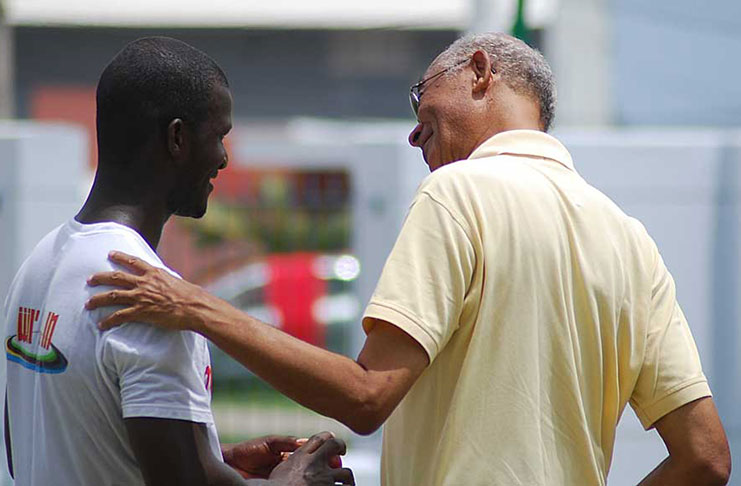TOO often we in the Caribbean believe that we are not good enough; something is not working and needs to be fixed; something is missing; and something special needs to be added to make us worthwhile.
The key to our success already lies inside us but these limiting beliefs hide it and conceal the wealth within. The following story is very instructive.
A young man had a clay statue that was in his family for generations and he always wished it were gold instead. When he earned some money he had the statue covered with gold and it looked just the way he wanted. But after a while the gold plating started to flake off in spots, so he had it gold-plated again. As time went by, he spent his resources maintaining the gold façade on the statue.

One day when his grandfather visited him, he showed the old man the statue, but he was a bit embarrassed because clay was showing through in some places. The old man who knew the statue well, took a moist cloth and started to rub it. After removing some of the clay he said, “Many years ago the statue must have fallen to the ground and got covered with mud. You wouldn’t have known that; but look here.”
As he continued to remove the clay, a bright yellow colour shone through. “Underneath the clay, your statue has been solid gold from the beginning. You didn’t have to put more gold on it. From now on all you have to do to show the gold is remove any clay or dirt that settles on the statue.”
Like the clay on the gold statue, negative self-images, low self-beliefs, self-doubts, and fear of failure hide the talent within players, undermine their concentration and sabotage their performance. Playing better is often more about correcting or removing these things than learning new skills, techniques and tactics. Clive Lloyd and Frank Worrell did just that. They helped the players to tap into the talent or ‘gold’ within themselves, and this enabled them to free up and express their natural ability.
Their teams were physically and technically talented, but they knew that success would have been limited had they not dealt with those inner obstacles. In those days self-coaching and peer coaching were the only coaching available to the players. This coaching created self-awareness, self-reliance and self- responsibility.
Since the introduction of professional coaching, West Indies cricket has been in an ever-increasing failure spiral. West Indies cricket is now at or near the bottom of the ICC’s Test and ODI rankings. It cannot sink any lower. The team failed to qualify for the last Champions Trophy and might miss the next World Cup if it does not do well against the weaker teams in the qualifying tournament in Zimbabwe next year. How embarrassing would that be?
In recent years, there has been a dramatic increase in the number of head coaches and specialist coaches, but the team’s poor performance continues. In the Caribbean there are now more cricket coaches than there has ever been, yet the need for good coaching has never been greater. The importance and relevance of good coaching are universally accepted, but the negative and damaging effects of over-coaching and substandard coaching are not.
Like the young man in the story above, our coaches have perpetuated the mistake of repeatedly gold-plating the clay instead of removing it to find the solid gold inside the players, as Worrell and Lloyd did. The good coach recognizes that internal obstacles are often more daunting than the external ones. Coaching is about unlocking the player’s potential. It is helping him to learn rather than to teach or instruct him.
But for most coaches, it is more difficult to give up instructing than it is to learn to coach.
Some coaches spend an inordinate amount of time on fitness and technique and in the process neglect the important mental factors that determine how well or how poorly those skills are chosen and executed. An African saying states that when a man falls, look at where he slips, not where he falls. The same applies to sport. When a player makes a technical error, look for the precipitating cause. It is usually found in the mind, not the body.
Today’s coaches are more clever and better educated about the game, but many of them lack the wisdom that will bring them success. When things go wrong they tend to blame the players instead of doing an honest self-examination to find out why they are unable to unlock the potential of their players. The good coaches use feedback from failures to question, fine tune, change, or improve their priorities and approaches.
Sir Garfield Sobers, the world’s greatest cricketer, was a very wise player. He once said, “If I had a free hand in coaching, I would initially spend most of my time teaching the basics of the game. Thereafter, I would devote an equal amount of time teaching the players how to identify and handle the many different situations they will face during the game.
I feel that this combination gives the player the best preparation and the best chance to do well.”
To this wise advice, I would add the enhancement of each player’s self-image, self-belief, self-motivation and self-discipline. Once the player gets the basics right, his performance will revolve around his self-image and self-belief. In the end, the depth of the player’s self-motivation and self-discipline determines the level of his success.
Revival of West Indies would be easier if the coaches follow some of the advice above, place learning above instructing, give up some of their control, promote commitment by engaging the players in self-analysis and in the design of tactics and strategy, and encourage the players to focus on self-coaching, peer coaching, self-reliance and self-responsibility. That was part of the modus operandi of Worrell and Lloyd.
Rudi V. Webster
